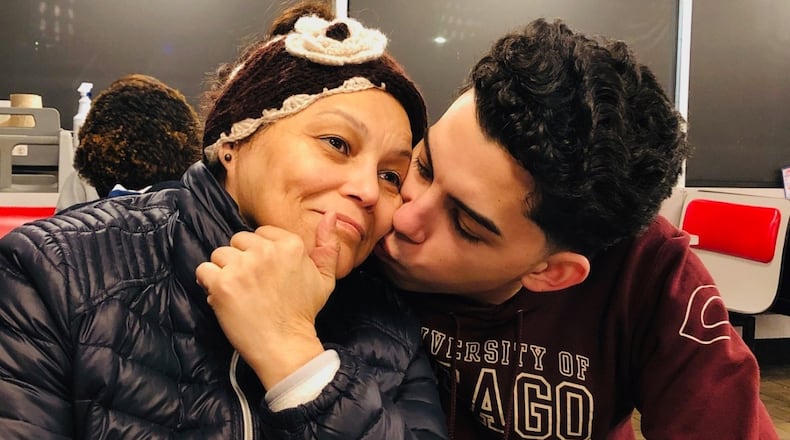Update this morning: Cristian Padilla Romero reports that ICE woke up his mother at midnight and removed her to an unknown location. Neither her family nor her attorney has any idea where she is.
“We fear she is being transported to the airport to be deported even though she still has motions and appeals pending,” says her son.
Original blog from yesterday:
Cristian Padilla Romero, the 2014 salutatorian of DeKalb's Cross Keys High School, wrote a column for the blog two weeks about the impending deportation of his mother to Honduras.
You can read his essay here.
Tania Romero is recovering from stage 4 cancer. Her son calls her the driving force in the academic success that propelled him from Cross Keys to Yale where he is now working toward his doctorate.
In an update today, Padilla Romero told me U.S. Immigration and Customs Enforcement rejected a temporary postponement of his mother’s deportation -- known as a stay of removal -- and is moving forward with deporting her.
“The Honduran Embassy is also now involved and they are also talking to ICE and requesting her release on humanitarian grounds,” said Padilla Romero. “Our attorney filed an appeal to the Bureau of Immigration Appeals on Friday as well, which should halt any attempts to deport her. As of now, we’re hopeful ICE will not break its own protocols by deporting her while she has motions pending.”
The former DeKalb County student has strong support at Yale where students Friday organized a phone bank that placed more than 600 calls to ICE and congressional offices.
In a guest column today, Lynn Cooley, dean of the Yale Graduate School of Arts & Sciences and the C.N.H. Long Professor of Genetics Professor of Molecular, Cellular & Developmental Biology and Cell Biology, calls for a halt to Tania Romero's deportation.
By Lynn Cooley
Cristian Padilla Romero’s mother Tania came to the United States from a village in Honduras when her son was a small boy. She worked three jobs, sacrificed greatly, and ultimately saw her son earn admission to Yale University as a Ph.D. student in Latin American history.
In 2016, Tania learned she had stage 4 cancer. She fought it, made progress, and had reason to be optimistic.
Then, in August 2019, she was stopped for a speeding violation and placed in an ICE detention center. She remains there today, perhaps not for long: Despite sympathetic politicians and press coverage, she’s on the verge of deportation, which Cristian sees as tantamount “to a death sentence” — in Honduras, his mother won’t get the medical care she needs.
I do not dispute the legal status of Cristian and his mother; as a matter of law, they are undocumented immigrants. But it’s time to rethink the legal parameters.
Whatever your opinion about how the Romeros came to this country, knowingly making it impossible to obtain necessary medical care is inhumane. The Romero family reminds us that this is a country built on the hard work and intellectual abilities of immigrants. We should not block access to the resources that make them — and all of us — better.
As dean of Yale’s Graduate School of Arts and Sciences, I stand by our doctoral student Cristian Padilla Romero as he awaits news of the impending deportation of his critically ill mother. My heart goes out to his family, and I worry that Cristian’s family crisis will jeopardize his ability to succeed in the long journey to a Ph.D.
No matter what position you take with regard to immigration, data show us immigrants who come to our universities are integral to the core missions of research and teaching. Indeed, immigrants and international scholars are critical to the scientific discoveries, life-saving medical breakthroughs and cultural innovations that define the United States.
In the last 20 years, 41 of the 131 (31.3%) U.S. Nobel laureates have been immigrants or foreign-born researchers working in the U.S.
Of Yale’s tenure-track faculty working on issues like climate change, cures for heart disease and racial injustice, quantum computing, brain function, and happiness among other pursuits, 22% are immigrants or identify as foreign-born.
These are the people who endeavor daily to save the world by solving one problem at a time.
The mission of Yale’s Graduate School of Arts and Sciences is “to educate graduate students to seek answers to life’s most challenging questions by leading in the advancement, application and preservation of knowledge. We carry out this mission by investing in and drawing upon the strengths of a collaborative, diverse and inclusive community of scholars and researchers.”
Why is a diverse community necessary to the pursuit of knowledge? Diverse teams simply yield better results. We solve problems better — more creatively and efficiently — with different minds at the table. This is the rationale supporting the moral imperative of inclusivity. Indeed, higher education depends on a diversity of perspectives and experiences. It depends on Cristian Padilla Romero and students like him.
Our current policies regarding immigration discourage other talented students from around the world from attending our universities and developing the connections that yield scientific discoveries and cross-cultural understanding. Every student that we lose to our restrictive immigration policy means fewer ideas, more unsolved problems, another roadblock to the advancement of knowledge.
It also means a world with a smaller chance of peace, a world in which the “slow diplomacy” of higher education comes to a halt.
Cristian is one student, and an emblem of many. We welcome and support each and every one.
About the Author
Keep Reading
The Latest
Featured



